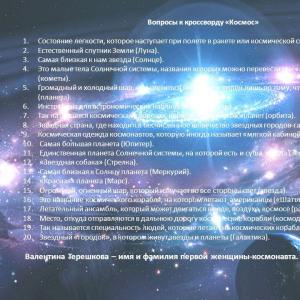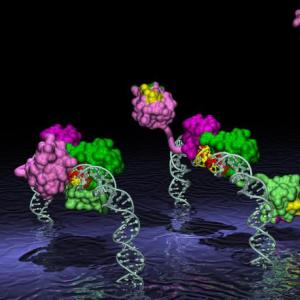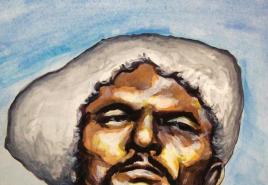Kazan Cooperative Institute (branch) of the Russian University of Cooperation (KKI). Russian University of Cooperation - branch in
Each person at certain moments in his life chooses his future life path. "Who to be?" - the question is not rhetorical. And the answer to the question “Where to study this?” becomes a serious stumbling block for many.
In order not to make a mistake that will subsequently cost you lost time, or even a significant sum of money, when choosing a higher educational institution, you need to pay attention not only to the availability state accreditation and licenses for educational activities, which goes without saying, but also on the following main points:
The best higher education institutions around the world are institutes and universities that have proven their reputation for a long time.
Russian University of Cooperation- one of the best economic universities in the country - was founded more than a hundred years ago, back in the days Russian Empire. Today the university has more than 22 branches throughout Russia, with more than 50,000 students studying.
The second criterion can be called the implementation by the university of a system of continuous professional education. It will follow from this that the state recognizes the existence of an established and constantly developing scientific school. At the Russian Cooperation University, all conditions have been created for the implementation of continuous professional education: preparatory courses, secondary, primary vocational education, specialty, bachelor's, master's, second higher education, postgraduate and doctoral studies. Also distinctive feature University are permanent courses of additional education.
The next important point is the public recognition of the university, its system of partnerships, especially with professional associations. They show the degree of recognition by society and professionals of the level of training of specialists. Partners Russian University cooperation are the Institute of Professional Accountants and Auditors of Russia, the Federation of Restaurateurs and Hoteliers, the Russian Guild of Bakers and Confectioners, the International Union of Lawyers.
Moreover, at the university you can join dual education programs and receive an international certificate or diploma, for example, the Cambridge University CAMBRIDGE International IT Diploma, recognized in 160 countries around the world. In addition, the university provides a wide variety of study programs foreign languages and Russian as a foreign language.
The history of the Russian University of Cooperation, of which the Kazan Cooperative Institute is a branch, dates back to August 1912. In these warm summer days The Second All-Russian Cooperative Congress, held in Kyiv, decided to create a cooperative institute.
The first step towards creating the institute was the opening at the Moscow People's University. A.L. Shanyavsky cooperative school. Famous cooperative practitioners and outstanding scientists taught here - M.I. Tugan-Baranovsky, A.F. Fortunatov, A.V. Chayanov and others. Over the four years of operation, the school has graduated more than 1,000 specialists.
The co-operative school paved the way for the establishment of a co-operative institute. On September 30, 1918, the All-Russian Cooperative Institute was opened in Moscow - an educational and scientific center for all types of cooperation in the country. The first composition of the Academic Council of the young university was headed by S.N. as director. Prokopovich, V.I. was elected dean. Anisimov.
Students of the institute already in the first academic year There were 66 people, and a year later their number doubled. Unfortunately, the university managed to graduate only one graduate.
Meanwhile, consumer cooperation organizations experienced an acute shortage of qualified personnel. Therefore, in 1930, the university was revived on the basis of the Faculty of Consumer Cooperation of the Moscow Industrial and Economic Institute and in 1935 it became known as the Moscow Institute of Soviet Cooperative Trade (MISKT). At first, he occupied small areas in Moscow in buildings on Novaya Basmannaya and Maroseyka, and soon the Centrosoyuz, using funds from consumer cooperation, built an entire institute complex at Volokolamsk Highway, 21/25. From 1941 to 1944 The institute was evacuated to Kazakhstan. In the early 50s, MISKT was connected with the Moscow Institute of National Economy named after G.V. Plekhanov.
The second time, thanks to the efforts of the Central Union of the USSR, the university was restored in 1959. Since then, the Moscow Cooperative Institute has settled in the city of Mytishchi, Moscow Region. Its educational and material base has been re-created, a qualified teaching staff has been formed, which trains highly qualified specialists for consumer cooperation and other sectors of the economy.
In 1987, on the basis of a resolution of the USSR Council of Ministers, the Moscow Cooperative Institute became an educational and scientific complex (ESC) of consumer cooperation, including a university, the All-Union Research Institute of Consumer Cooperation and the Institute for Advanced Studies. In 1991, the UNK came under the jurisdiction of the Central Union Russian Federation.
In 1992, the status of the institute changed - it was reorganized into the Moscow University of Consumer Cooperation; in 2000 - renamed into the educational institution "Moscow University of Consumer Cooperation", in 2004 - into the educational institution of higher professional education of the Central Union of the Russian Federation "Moscow University of Consumer Cooperation".
In 2006, the University, by Decree of the Board of the Central Union of the Russian Federation dated January 11, 2006 No. 1-P, was transformed into an autonomous non-profit organization of higher professional education of the Central Union of the Russian Federation “Russian Cooperation University”.
The Russian University of Cooperation today is the main educational and scientific center of the cooperative education system in Russia. Today it is the largest network university in Russia. Currently, branches of the Russian University of Cooperation successfully operate in the following cities of Russia: Arzamas, Bryansk, Vladimir, Volgograd, Izhevsk, Kazan, Kaliningrad, Krasnodar, Murmansk, Michurinsk, Veliky Novgorod, Petropavlovsk-Kamchatsky, Saransk, Saratov, Smolensk, Syktyvkar, Ufa , Cheboksary. The structure of the University also includes educational institutions of secondary and primary vocational education.
The University has an effective system continuing education, which includes pre-university education, primary, secondary and higher vocational education, postgraduate and additional professional education - advanced training and retraining of specialists, postgraduate and doctoral studies, defense of master's and doctoral dissertations.
For successful international activities and merits in training highly qualified specialists for the consumer cooperation system of the USSR in 1980, the Moscow Cooperative Institute of the Central Union was awarded the order Friendship of peoples. Evidence of the international recognition of the University are the awards of the International Quality Convention: “International Gold Quality Mark” (2002, London) and “International Platinum Quality Mark” (2003, Paris).
Over its 100-year history, the University has trained over 100,000 highly qualified specialists for the Russian economy, incl. consumer cooperation systems. The geography of work activity of University graduates is extensive and covers not only regions of the Russian Federation, but also countries near and far abroad. Over the period of its activity, the University has trained several thousand graduates from 72 countries. They successfully work in enterprises and organizations of various sectors of the economy: industry, trade and public catering, procurement, foreign economic activity, in government and management bodies, carry out pedagogical activity V educational institutions primary, secondary and higher vocational education.
The Russian University of Cooperation operates on the basis of the Civil Code of the Russian Federation, the Law “On Education”, the Federal Law of the Russian Federation “On Higher and Postgraduate Education” vocational education", resolutions, orders and other regulations of the Ministry of Education of the Russian Federation, the Central Union of the Russian Federation, the Charter of the Autonomous Non-Profit Organization of Higher Professional Education of the Central Union of the Russian Federation "Russian University of Cooperation". The university is located on the street. V. Voloshina in Mytishchi, Moscow region.
The quarter-century history of the higher cooperative educational institution of the Republic of Tatarstan - the Kazan Cooperative Institute, a branch of the Russian University of Cooperation, goes back to the perestroika 1980s. October 13, 1987 The Central Union of the USSR issued Order No. 366, which indicated that it should be recognized as necessary to open a branch of the Moscow Cooperative Institute in Kazan on the basis of the Belgorod Cooperative Institute. This event became one of the most important in the formation of the higher cooperative school of the Republic of Tatarstan.
Nowadays the Kazan Cooperative Institute of the Russian University of Cooperation is a promising industrial university in the republic. Training at the institute is carried out taking into account the fact that our graduates will be able to subsequently apply their knowledge in cooperative organizations, the field of economic activity in our country or abroad.
Our Faculty is a structural subdivision of the Kazan Cooperative Institute (branch) of the Russian University of Cooperation - a university with a 100-year history, with rich experience and traditions of training highly qualified specialists. Therefore, the main educational strategy at the Faculty is to prepare specialists for professional activity, career growth and quality life. The faculty conducts multidisciplinary training of specialists for the main sectors of the economy.
Today, the Faculty is doing everything possible to organize high-quality educational process, maximally focused on the requirements of practical and scientific prospects for the development of Russia. The teaching staff is highly demanding of their work. It manifests itself in conducting the educational process at a high scientific and methodological level, in the development of textbooks, educational and methodological manuals, used in teaching.
About the university
The history of our educational institution dates back to August 1912. On these warm summer days, the Second All-Russian Cooperative Congress, held in Kyiv, decided to create a cooperative institute.
The first step towards creating the institute was the opening at the Moscow People's University. A.L. Shanyavsky cooperative school. Famous cooperative practitioners and outstanding scientists taught here - M.I. Tugan-Baranovsky, A.F. Fortunatov, A.V. Chayanov and others. Over the four years of operation, the school has graduated more than 1,000 specialists.
The co-operative school paved the way for the establishment of a co-operative institute. On September 30, 1918, the All-Russian Cooperative Institute was opened in Moscow - an educational and scientific center for all types of cooperation in the country. The first composition of the Academic Council of the young university was headed by S.N. as director. Prokopovich, V.I. was elected dean. Anisimov.
Already in the first academic year, 66 people became students of the institute, and a year later their number doubled. Unfortunately, the university managed to graduate only one graduate.
Meanwhile, consumer cooperation organizations experienced an acute shortage of qualified personnel. Therefore, in 1930, the university was revived on the basis of the Faculty of Consumer Cooperation of the Moscow Industrial and Economic Institute and in 1935 it became known as the Moscow Institute of Soviet Cooperative Trade (MISKT). At first, he occupied small areas in Moscow in buildings on Novaya Basmannaya and Maroseyka, and soon the Centrosoyuz, using funds from consumer cooperation, built an entire institute complex at Volokolamsk Highway, 21/25. From 1941 to 1944 The institute was evacuated to Kazakhstan. In the early 50s, MISKT was connected with the Moscow Institute of National Economy named after G.V. Plekhanov.
The second time, thanks to the efforts of the Central Union of the USSR, the university was restored in 1959. Since then, the Moscow Cooperative Institute has settled in the city of Mytishchi, Moscow Region. Its educational and material base has been re-created, a qualified teaching staff has been formed, which trains highly qualified specialists for consumer cooperation and other sectors of the economy.
In 1987, on the basis of a resolution of the USSR Council of Ministers, the Moscow Cooperative Institute became an educational and scientific complex (ESC) of consumer cooperation, including a university, the All-Union Research Institute of Consumer Cooperation and the Institute for Advanced Studies. In 1991, the UNK came under the jurisdiction of the Central Union of the Russian Federation.
In 1992, the status of the institute changed - it was reorganized into the Moscow University of Consumer Cooperation; in 2000 - renamed into the educational institution "Moscow University of Consumer Cooperation", in 2004 - into the educational institution of higher professional education of the Central Union of the Russian Federation "Moscow University of Consumer Cooperation".
In 2006, the University, by Decree of the Board of the Central Union of the Russian Federation dated January 11, 2006 No. 1-P, was transformed into an autonomous non-profit organization of higher professional education of the Central Union of the Russian Federation “Russian Cooperation University”.
The Russian University of Cooperation today is the main educational and scientific center of the cooperative education system in Russia. Today it is the largest network university in Russia. More than 100 thousand students study in it and its 22 branches. Currently, branches of the Russian University of Cooperation successfully operate in the following cities of Russia: Arzamas, Bryansk, Vladimir, Volgograd, Ivanovo, Izhevsk, Kazan, Kaliningrad, Krasnodar, Murmansk, Michurinsk, Veliky Novgorod, Petropavlovsk-Kamchatsky, Saransk, Saratov, Smolensk, Syktyvkar , Ufa, Khabarovsk, Khimki, Moscow region, Cheboksary. The structure of the University also includes educational institutions of secondary and primary vocational education.
In accordance with the rating of the Ministry of Education and Science of the Russian Federation, the University has been among the top ten leading economic universities in Russia over the past five years.
The University has an effective system of continuous education, which includes pre-university education, primary, secondary and higher vocational education, postgraduate and additional professional education - advanced training and retraining of specialists, postgraduate and doctoral studies, defense of master's and doctoral dissertations.
For successful international activities and services in training highly qualified specialists for the USSR consumer cooperation system, in 1980 the Moscow Cooperative Institute of the Central Union was awarded the Order of Friendship of Peoples. Evidence of the international recognition of the University are the awards of the International Quality Convention: “International Gold Quality Mark” (2002, London) and “International Platinum Quality Mark” (2003, Paris).
Over its 95-year history, the University has trained over 90,000 highly qualified specialists for the Russian economy, incl. consumer cooperation systems. The geography of work activity of University graduates is extensive and covers not only regions of the Russian Federation, but also countries near and far abroad. Over the period of its activity, the University has trained several thousand graduates from 72 countries. They work successfully at enterprises and organizations in various sectors of the economy: industry, trade and public catering, procurement, foreign economic activity, in government and management bodies, and carry out teaching activities in educational institutions of primary, secondary and higher vocational education.
The Russian Cooperation University operates on the basis of the Civil Code of the Russian Federation, the Law “On Education”, the Federal Law of the Russian Federation “On Higher and Postgraduate Professional Education”, decrees, orders and other regulations of the Ministry of Education of the Russian Federation, the Central Union of the Russian Federation, the Charter of the ANO VPO of the Central Union of the Russian Federation “Russian Cooperation University " The university is located on the street. V. Voloshina in Mytishchi, Moscow region.
Higher cooperative educational institution The Republic of Tatarstan turned 20 years old in 2007. October 13, 1987 The Central Union of the USSR issued Order No. 366, which indicated that it should be recognized as necessary to open a branch of the Moscow Cooperative Institute in Kazan on the basis of the Belgorod Cooperative Institute. This event became one of the most important in the formation of the higher cooperative school of the Republic of Tatarstan. Nowadays the Kazan Cooperative Institute of the Russian University of Cooperation is a promising industrial university in the republic. Training at the institute is carried out taking into account the fact that our graduates will be able to subsequently apply their knowledge in cooperative organizations, the field of economic activity in our country or abroad. Today, a strong teaching staff has been formed at the Kazan Cooperative Institute. 5 departments employ professors, associate professors, doctors and candidates of sciences who have extensive work experience in universities. Each new decade in the history of the institute is different from the previous one. At the end of the 80s we took our first steps, the first students appeared. During the difficult period at the turn of the 1980-90s, teachers and staff made every effort to ensure that the Kazan Cooperative Institute not only survived, but also became an institute with new prospects. The next decade was marked by important processes in the life of the cooperative school in Russia: in connection with the restructuring educational system The institute became an integral part of the Russian University of Cooperation of the Central Union of the Russian Federation. The reform has made the learning process more modern, innovative, and meets the requirements of today's realities. Twenty years is the time of creative maturity of the team of the Kazan Cooperative Institute. I am confident that our institute will increase its contribution to the implementation of the Concept for the development of consumer cooperation in Russia, put forward by the Central Union of the Russian Federation.







